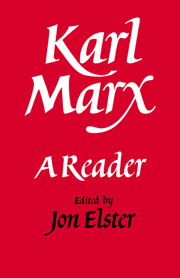VI - Class Consciousness and Class Struggle
Published online by Cambridge University Press: 05 June 2012
Summary
History, for Marx, was the history of class struggle. This view has been widely influential and not just in Marxist circles. Once again, however, it is not easy to guide the reader to a systematic presentation. The one time Marx sat down to expound his theory of classes, he broke off after a few pages (Selection 23). To reconstruct his theory, the best place to start is with the first section of The Communist Manifesto (Selection 19). Next, one should go on to read his analyses of class structure and class struggle in England (Selection 20) and France (Selections 21 and 22). Another text which may be consulted is Selection 8b.
FROM THE COMMUNIST MANIFESTO
The passage excerpted here is the first section of this famous document. (The second section is reproduced as Selection 24 below.) Jointly written by Marx and Engels, it was commissioned by the Communist League, a small organization of European workers. It is not only an unsurpassed masterpiece of political propaganda, but also an important theoretical statement, summarizing most of Marx's views as they had developed up to that time.
BOURGEOIS AND PROLETARIANS
The history of all hitherto existing society is the history of class struggles.
Freeman and slave, patrician and plebeian, lord and serf, guild-master and journeyman, in a word, oppressor and oppressed, stood in constant opposition to one another, carried on an uninterrupted, now hidden, now open fight, a fight that each time ended, either in a revolutionary re-constitution of society at large, or in the common ruin of the contending classes.
- Type
- Chapter
- Information
- Karl MarxA Reader, pp. 223 - 256Publisher: Cambridge University PressPrint publication year: 1986



